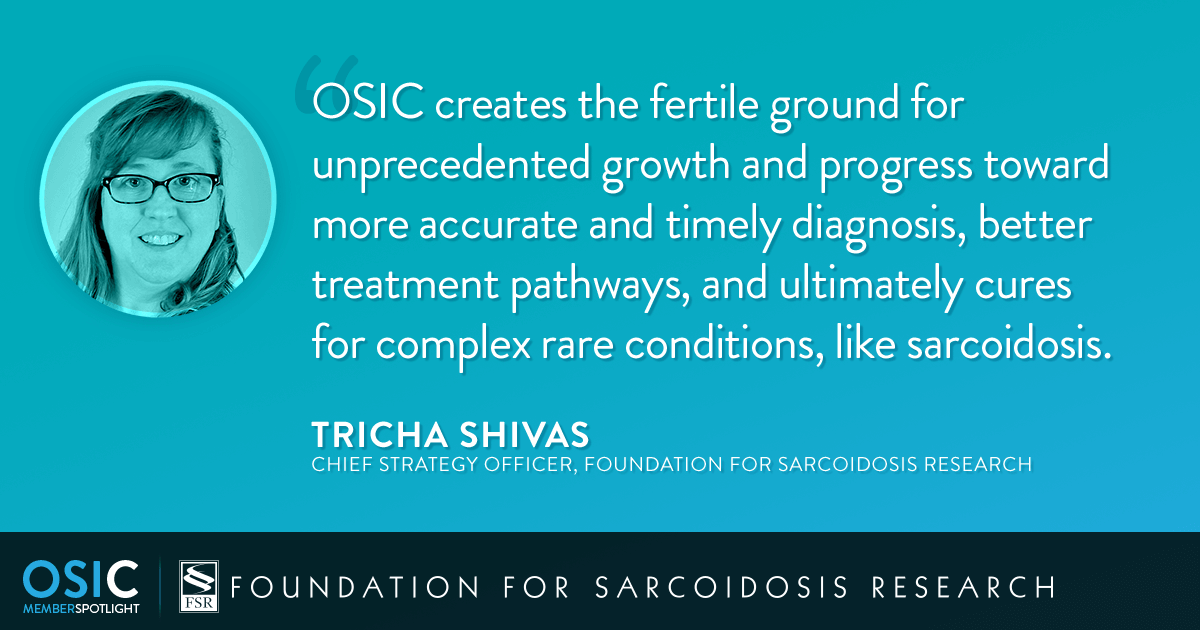A Q&A with Tricha Shivas
Established in 2000, the Foundation for Sarcoidosis Research (FSR), is the leading international non-profit organization dedicated to finding a cure for sarcoidosis and improving care for sarcoidosis patients through research, education and support.
What is sarcoidosis?
Sarcoidosis (pronounced sar-COY-doe-sis) is a rare inflammatory disease of unknown cause, characterized by the formation of granulomas — tiny clumps of inflammatory cells — in one or more organs of the body. It affects the lungs in approximately 90% of cases, but can affect almost any organ in the body and, in more advanced or chronic cases, can impact multiple organs at the same time
Despite increasing advances in research, sarcoidosis remains difficult to diagnose with limited treatment options and no known cure. It’s estimated that its prevalence in the US ranges between 150,000 and 200,000, with an approximate 1.2 million individuals affected worldwide. Since its inception, the FSR has fostered over $6 million in sarcoidosis-specific research efforts and has worked diligently to provide resources to thousands.
We spoke with Tricha Shivas, FSR’s chief strategy officer, about the value she sees in OSIC and what she hopes we can accomplish together through collaboration and shared data.
The Foundation for Sarcoidosis Research (FSR) is one of OSIC’s newest members. What drew you to our organization?
OSIC is working to ensure that through the gathering and distribution of open source medical imaging and data, we can expedite research and understanding for diseases such as sarcoidosis through the support and collaboration of patient advocacy organizations, like FSR, as well as biotech, pharmaceutical companies, medical imaging companies, and world-renowned academic researchers. By bringing all these forces to the table and creating an open sharing environment, OSIC creates the fertile ground for unprecedented growth and progress toward more accurate and timely diagnosis, better treatment pathways, and ultimately cures for complex rare conditions, like sarcoidosis. We are proud to be a part of OSIC, and look forward to a future without sarcoidosis.
What unique perspective does your organization bring to OSIC?
Sarcoidosis is a complex multi-organ, multi-system disease that disproportionately impacts African American women, is difficult to diagnosis, and offers significant challenges in the identification of impactful biomarkers, end points, and in drug development and clinical trial design. FSR hopes to put health disparities and disease complexity front-and-center in tool development and clinical trial design to ensure that treatments and therapies are responsive to the needs of all, especially those most severely and disproportionately impacted by sarcoidosis.
Why do you believe other organizations should join OSIC
Although the data being gathered through this consortium is invaluable, the most valued part of this group are the efforts to bring together collaborators from all parts of the scientific, medical and research fields in order to spark creativity and foster data sharing to promote acceleration.
In the next five years, what do you hope OSIC will have contributed to the fight against ILDs?
All forms of ILD, including sarcoidosis, commonly go undiagnosed for many years. It is our belief and deepest hope that through collaboration and shared data provided through OSIC, we can reduce the time to diagnosis leading to improved outcomes and quality of life for all impacted by sarcoidosis and other ILD-related disease states.
For more information on the Foundation for Sarcoidosis Research (FSR), visit stopsarcoidosis.org.
|
Get the latest OSIC news delivered right to your inboxNo spam. Just news.
By clicking the 'Subscribe to OSIC News' button, you consent to receive news and promotional materials from OSIC and agree to the processing of your personal data for this purpose as outlined in our Privacy Policy. You can withdraw your consent at any time.
|
Copyright © 2024 Open Source Imaging Consortium (OSIC). All rights reserved.



 RSS Feed
RSS Feed

